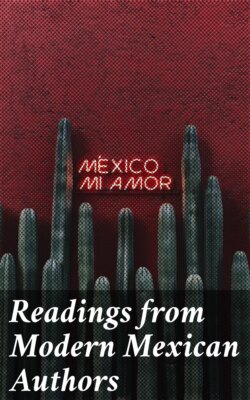Читать книгу Readings from Modern Mexican Authors - Группа авторов - Страница 18
На сайте Литреса книга снята с продажи.
INDIAN LANGUAGES.
ОглавлениеTable of Contents
An immense field is opened before my view, in the linguistic and historic works, which we owe to the sixteenth century. On their arrival the missionaries found themselves face to face with a language entirely unknown to the inhabitants of the Old World; and as they progressed with their apostolic labors they discovered with pain that this land, where the curse of Babel seems to have fallen with especial weight, was full of different languages, of all forms and structures, some polished, others barbarous, for which they had neither interpreters, nor teachers, nor books, and for the most part not even a people of culture who spoke them. That difficulty in itself would suffice to discourage the most intrepid mind; but there did not in the world exist anything which could quench the fire of charity with which the missionaries were aglow. They undertook the contest with the hundred-headed monster and vanquished him. Today the study of a group of languages, or even of one tongue, raises the fame of the philologist to the clouds, although he usually finds the way pathed out for him by previous labors; but the missionaries learned, or rather divined all, from the first beginnings; a single man at times attacked five or six of these languages without analogy, without a common filiation, without known alphabet, with nothing that might facilitate the task. Today such investigations are made, for the most part, in the tranquillity and shelter of the study; then, in the fields, the groves, upon the roads, under the open sky, in the midst of fatigues of the mission journey, of hunger, of lack of clothing, of sleeplessness.
The missionaries did not undertake such heavy tasks to attain fame; they did not compare the languages, nor treat them in a scientific way; they tried to reduce them all to the plan of Latin; but they went straight to the practical end of making themselves comprehensible to the natives, and laid firm foundations, upon which might be reared a magnificent structure. The linguistic section of our literature is one of those which most highly honor it, and this, although we know but a portion of it. Countless are the writings which have remained unpublished, either for lack of patronage to supply the cost of printing or because they were translations of sacred texts which it was not permitted to place in vulgar hands. Father Olmos is a notable example of the sad fate which befell many of these writers. It is believed that he knew various Chichimecan dialects, because he was a long time among them, and it is certain that he wrote without counting other books, grammars, and vocabularies of the Aztec, Huastec, and Totonac languages. Of such great works only his Aztec grammar has survived, which, after circulating during more than three centuries through public and private libraries, has finally been saved, thanks to the beautiful edition of it which was published, not in Mexico, but in Paris in 1875. In a history of Mexican literature, notices and analysis of the books on the native languages—today so much esteemed and studied in foreign lands—claim a place of honor.
